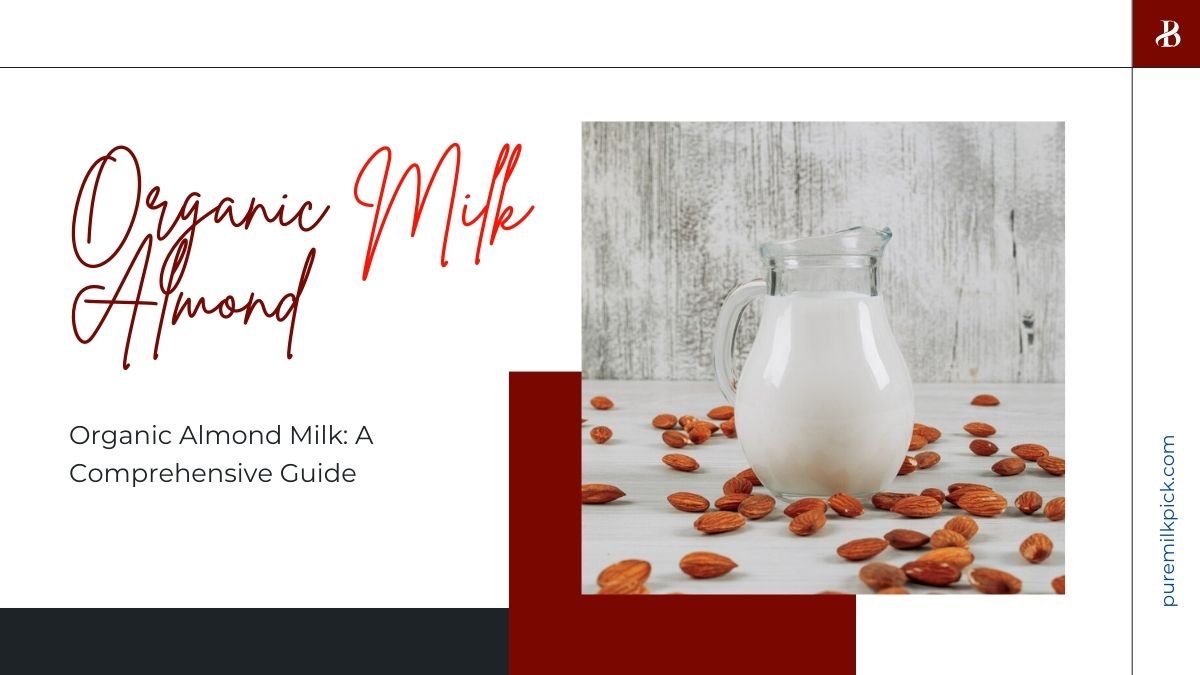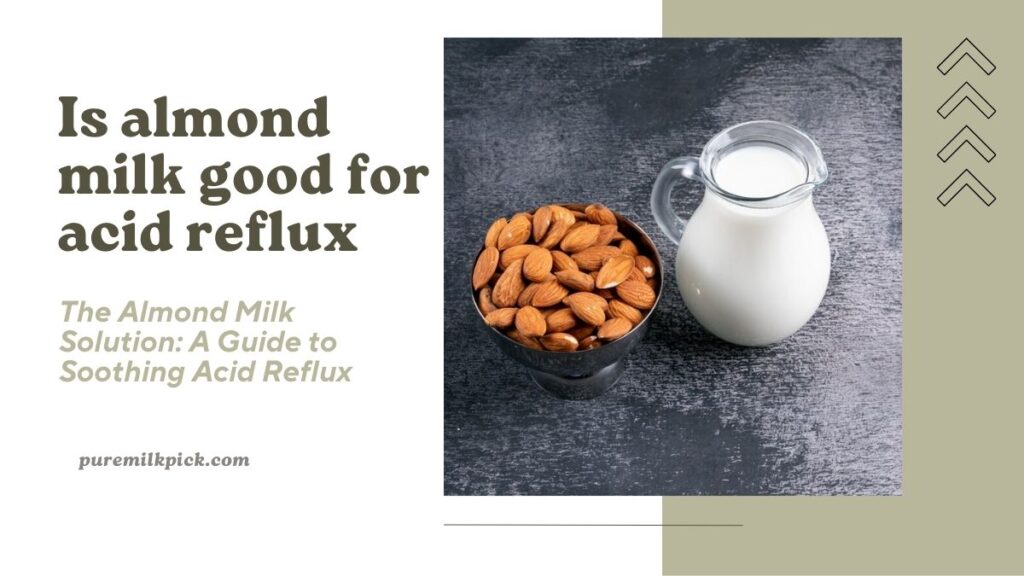In recent years, almond milk has become a favorite among health-conscious consumers. This non-dairy alternative, derived from processing almonds, possesses a creamy texture and a slightly nutty flavor, making it a versatile ingredient in various dishes and beverages.
Organic almond milk differentiates itself owing to its production style, which is devoid of pesticides, artificial additives, and genetically modified organisms. Consumers are increasingly gravitating towards organic almond milk as they opt for cleaner, more nutrient-rich dietary choices in their pursuit of a healthier lifestyle.
The nutritional profile of organic almond milk is impressive—rich in vitamins E and D, low in calories and sugar, and a good source of calcium. It’s a beneficial addition to any diet, particularly for those with dietary restrictions or allergies.
Beyond just health benefits, organic almond milk also treads lightly on the environment. The organic farming techniques used in almond cultivation help maintain soil health and reduce water usage, making it a sustainable choice for the eco-conscious. This article aims to delve deeper into these facets and shed more light on why organic almond milk deserves a spot in your daily diet.
Understanding Organic Almond Milk
Definition of organic almond milk
Organic almond milk is a nutrient-rich, dairy-free alternative made from almonds cultivated without the use of synthetic fertilizers, pesticides, or any genetically modified organisms. The almonds are soaked, ground, and then strained to produce a creamy, naturally sweet liquid.
Differentiating organic from conventional almond milk
Organic almond milk stands out from conventional almond milk, primarily due to the farming techniques employed. While conventional almond milk may contain residues from synthetic pesticides and fertilizers, organic almond milk is produced from almonds grown in natural, pesticide-free environments, thereby ensuring a cleaner, healthier product.
Certification processes and standards for organic almond milk production
The certification process for organic almond milk production is stringent and comprehensive. It necessitates adherence to strict standards set by regulatory bodies such as the USDA in the United States, which mandates that the almonds used in the production must be grown on soil that has been free of prohibited substances for three years before harvest. The certification process also ensures that the entire production line, from cultivation to packaging, adheres to these organic standards. This rigorous process reassures consumers about the quality and integrity of their organic almond milk.
Read More: The Pacific Almond Milk: Nutritional Richness Elegance
Nutritional Profile of Organic Almond Milk
Nutrients found in organic almond milk
Organic almond milk is brimming with a range of healthy nutrients. It’s a great source of vitamin E, a powerful antioxidant that helps protect the body against oxidative damage, and vitamin D, which is essential for bone health and immune function. Organic almond milk also provides a good amount of calcium — a nutrient vital for bone health and is often fortified with B vitamins for added nutritional value. It is low in protein compared to dairy milk, but is also considerably lower in calories and sugar, making it a good option for those managing their caloric intake.
The nutritional benefits of dairy milk
When compared with other plant-based alternatives and dairy milk, organic almond milk stands out for its balance of nutrition and lower calorie content. For instance, soy and oat milk often contain more protein but also come with a higher sugar content. Dairy milk, on the other hand, contains more protein and calcium but is also high in saturated fats and calories.
Organic almond milk caters well to specific dietary needs. For those with lactose intolerance, it is a great substitute for dairy milk, as it is naturally lactose-free. It’s also a popular choice among vegans and vegetarians, being completely plant-based. However, it is worth noting that because almond milk is low in protein, individuals using it as a complete milk replacement should ensure they are getting sufficient protein from other sources in their diet.

Sustainability and Environmental Impact
The Ecological Footprint of Organic Almond Milk Production
Organic almond milk, compared to its conventional counterpart, has a smaller ecological footprint. The elimination of synthetic fertilizers and pesticides in organic farming reduces the contamination of water sources, prevents soil degradation, and decreases the release of harmful greenhouse gases. Additionally, many organic almond farms practice water conservation measures, which is particularly important considering that almond trees are water-intensive crops.
Comparison of Environmental Impact Between Organic and Non-Organic Almond Milk
The environmental impact of organic almond milk is significantly less than that of non-organic almond milk. Organic farming practices contribute to biodiversity, promoting a healthier ecosystem. Non-organic almond farming, on the other hand, often involves the use of synthetic fertilizers and pesticides, which can contaminate water sources and harm beneficial insects and soil health. Furthermore, the energy-intensive process of producing synthetic fertilizers also contributes to higher carbon emissions.
Sustainable Farming Practices in Organic Almond Cultivation
Organic almond cultivation is characterized by sustainable farming practices aimed at preserving the ecosystem. These include crop rotation to maintain soil fertility, natural pest management techniques to protect biodiversity, and the use of organic compost instead of synthetic fertilizers. Such practices not only ensure the production of high-quality almonds but also contribute to the long-term sustainability of the farming environment.
Factors to Consider When Choosing Organic Almond Milk
Label Reading and Understanding Ingredients in Almond Milk
When selecting organic almond milk, it’s crucial to understand what the listed ingredients signify. Opt for products with minimal and recognizable ingredients. Genuine organic almond milk should contain water, organic almonds, and potentially added vitamins and minerals. Be wary of unnecessary additives, such as artificial sweeteners, thickeners, and preservatives.
Exploring Fair Trade and Ethical Considerations in Almond Milk Production
Fairtrade and ethical considerations are significant when choosing organic almond milk. Fairtrade practices ensure that farmers get fair compensation for their labor, contributing to sustainable socioeconomic growth. Find brands that support fair trade practices and ensure their products are ethically sourced.
Personal Health Factors and Considerations When Opting for Organic Almond Milk
Personal health is a key factor to consider when opting for organic almond milk. If you have specific dietary needs or restrictions, such as a low-calorie or low-sugar diet, or if you are lactose intolerant or vegan, organic almond milk could be an excellent choice. However, it’s always best to consult with a healthcare professional or registered dietitian to ensure that it aligns with your personal health goals and nutritional needs.
Cooking and Consumption Tips
Organic almond milk is a versatile ingredient that can be effortlessly incorporated into your daily diet and cooking routine. It serves as a wonderful dairy substitute in recipes – from savory dishes to baked goods. Use it in your morning cereal, oatmeal, smoothies, or coffee for a creamy texture and subtle nutty flavor. In baking, it works well in cakes, muffins, and pancakes, helping to keep them moist while adding a distinct flavor.
Using Organic Almond Milk in Cooking and Baking
For those who enjoy home cooking and baking, organic almond milk can be an excellent dairy substitute. It blends well in smoothies, adding a refreshing touch, and when used in baking, it contributes to a moist texture in cakes and muffins. It can also be used in making creamy sauces or soups, offering a lighter but equally satisfying alternative to traditional dairy products.
Incorporating Organic Almond Milk into Daily Consumption for Maximum Benefits
Organic almond milk can be easily incorporated into your daily consumption for health benefits. Starting your day with a glass of almond milk, adding it to your breakfast cereal, or blending it into your post-workout smoothie can enhance your vitamin and mineral intake. Remember, while it’s a healthier alternative, balance, and variety in your diet are essential to reap maximum nutritional benefits.
Storage and Shelf-Life Guidelines for Organic Almond Milk
Proper storage is crucial to maintain the quality and extend the shelf-life of organic almond milk. Unopened, it can be stored in a cool, dry place until the ‘best by’ date. Once opened, it needs to be refrigerated and is typically safe to consume within 7-10 days. Always check the milk before use – if it has a sour smell, color change, or shows signs of mold, it’s best to discard it.

Addressing Common Myths and Concerns
Debunking Misconceptions about Almond Milk Production and Nutrition
There are several misconceptions surrounding almond milk production and nutrition. For instance, it’s often assumed that almond milk lacks substantial nutritional value compared to cow’s milk. However, while it’s true that almond milk is lower in protein, it’s rich in several vital nutrients, including vitamin E, magnesium, and potassium. Furthermore, it provides the added benefit of being lactose-free, making it an excellent alternative for those with lactose intolerance.
Addressing Concerns Related to Allergens, Sustainability, and Nutritional Value
Despite the numerous benefits of almond milk, some concerns need addressing. As almonds are a common allergen, people with nut allergies should avoid almond milk. Regarding sustainability, while organic almond farming is more eco-friendly than traditional dairy farming, almonds are a water-intensive crop, and consumers should be aware of the environmental impact. Finally, not all almond milk is created equal. Some brands may add sugar or other additives, so it’s critical to read the labels and choose products with minimal and recognizable ingredients.
Providing Clarity on Controversies Surrounding Almond Milk Industry Practices
The almond milk industry has faced criticism over its farming practices, particularly the use of honeybees for pollination, which has been linked to large-scale bee deaths. While this is an issue that needs addressing, it’s important to note that this is not exclusive to almond farming and is a broader agricultural concern. Consumers can play their part by choosing brands that prioritize sustainable and ethical farming practices.
Conclusion
Choosing organic almond milk is a decision that extends beyond the carton. It encompasses understanding the product’s ingredients, the ethical considerations in its production, personal health factors, and the best ways to cook, consume, and store it. Additionally, it involves debunking common myths and addressing legitimate concerns about almond milk’s production and nutrition. The key is to be informed and mindful – read labels, understand your health needs, be aware of storage guidelines, and stay updated about industry practices. Select brands that align with your values and health goals, and remember, balance and variety are vital for a nutritious diet. Whether you’re enjoying it in your morning cereal, baking a batch of muffins, or simply having a glass, organic almond milk can be a healthful and tasty addition to your diet.
Frequently Asked Questions
Although organic almond milk has less protein compared to cow’s milk, it is rich in other essential nutrients such as vitamin E, magnesium, and potassium. It’s also lactose-free, making it a great alternative for those with lactose intolerance.
Once opened, organic almond milk should be stored in the refrigerator and is usually safe to consume within 7-10 days. Always check for any signs of spoilage such as sour smell, color change, or presence of mold before use.
Not all almond milk brands are created equal. Some may add sugar or other additives, so make sure to read the labels and choose products with minimal and recognizable ingredients. Regarding sustainability, consumers can make a difference by choosing brands that prioritize sustainable and ethical farming practices.



